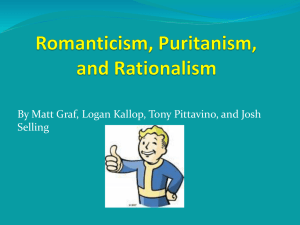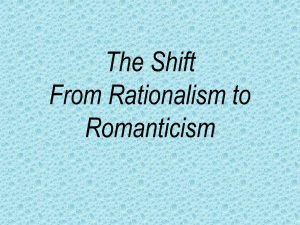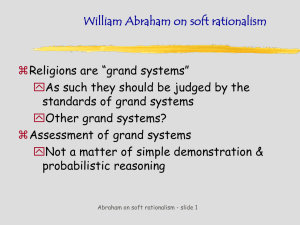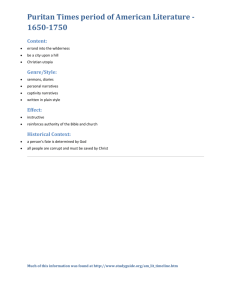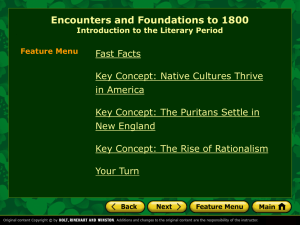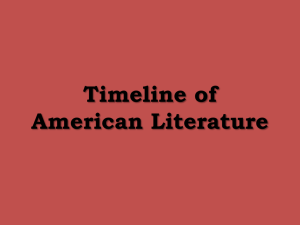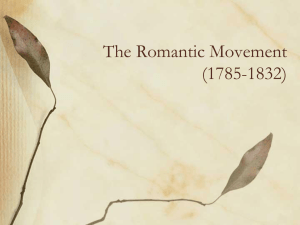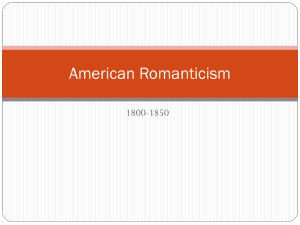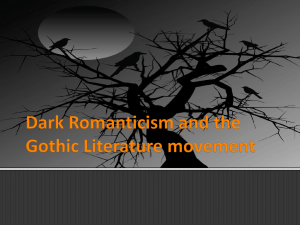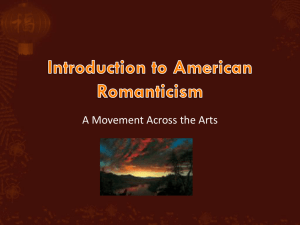Rationalism
advertisement
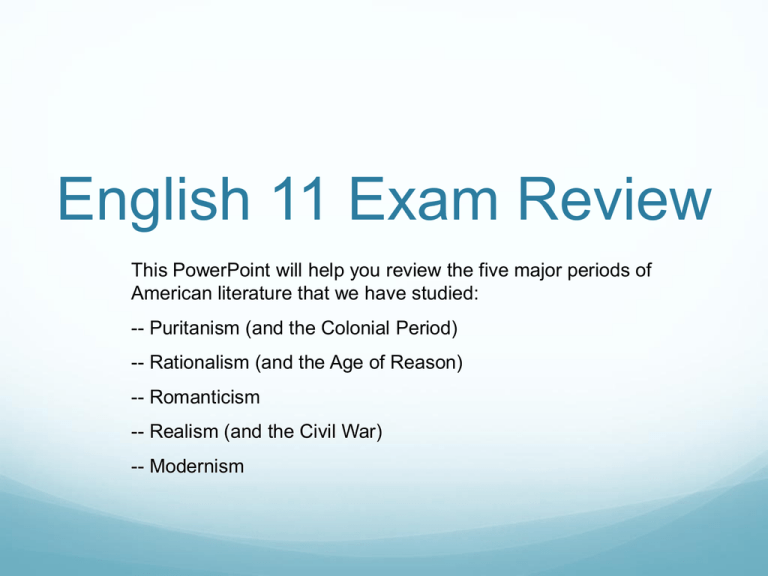
English 11 Exam Review This PowerPoint will help you review the five major periods of American literature that we have studied: -- Puritanism (and the Colonial Period) -- Rationalism (and the Age of Reason) -- Romanticism -- Realism (and the Civil War) -- Modernism Let’s take a look at the main concepts related to our first two literary periods: -- Puritanism -- Rationalism Puritanism vs Rationalism: Attitude toward Man Puritanism Rationalism Men are naturally evil. Men are basically good and perfectible. We are all born sinners because of Adam and Eve’s original sin. Humans are born as a “clean slate,” onto which parents and society “write.” Attitude toward Nature, Civilization, and the City Puritanism Nature is dangerous, savage, and evil. Rationalism Nature is wild and uncivilized. The devil (the “Black Man”) lives in nature. The city is a place of opportunity, advancement, and progress. The city is a place of security (safety in numbers). Attitude toward Native Americans Puritanism Native Americans were savages because they were not Christian (not chosen by God for heaven). Rationalism Native Americans were savages because they were uneducated and uncivilized (Thomas Jefferson said so). Man’s Relationship with God Puritanism God intervenes in the lives of humans through providence. Rationalism God does not reveal himself or get involved in human affairs. •There are natural laws God (and the devil) are available to man active in human lives. through reason. •The universe operates like clockwork; God starts the clock and just lets it run. How is your destiny (heaven or hell) determined after death? Puritanism Predestination determines destiny after death, and nothing humans do can change it. God decided before we were born who would go to heaven and who would not. Rationalism God rewards good works and punishes crimes. Attitude toward Learning and Knowledge Puritanism Learning to read and write was essential so people could study the Bible. The New England primer taught Puritans the alphabet and also Bible lessons. Rationalism Self-knowledge was an important part of being educated (Ben Franklin’s Plan for Moral Perfection). Man could use logic and science to make discoveries about the world. How should you live? Most important values? Puritanism Rationalism •One should live with simplicity, temperance and industriousness. One should live by doing good works, trying to improve oneself, and seeking happiness. •One should live by example as if they are a member of the elect (chosen by God). Rationalism: A Few Highlights The belief that human beings can arrive at truth by using reason, rather than by relying on the authority of the past, on religious faith, or on intuition. Puritanism vs. Rationalism Puritanism “God is actively and mysteriously involved in the workings of the universe.” Rationalism Sir Isaac Newton said God is a “clockmaker”. God’s special gift to humanity was reason – “the ability to think in an orderly, logical manner.” Rationalism: The Watchmaker Theory Sir Isaac Newton compared God to a watchmaker. Having created the perfect mechanism of this universe, God then left his creation to run on its own, like a clock. Rationalism: People are Basically Good 1. 2. 3. 4. Believed: “that the universe was orderly and good” “in the perfectibility of every individual thought with the use of reason” “that God’s objective was the happiness of his creatures” “the best form of worship was to do good for others” Rationalism & Revolution The American struggle for independence was justified by rationalist principles. The Declaration of Independence bases its arguments on rationalist assumptions about relations between people, God, and natural law. The Rationalist Worldview – Recap (1) People arrive at truth by using reason rather than relying on the authority of the past, on religion, or on non-rational mental processes, such as intuition. God created the universe, but does not interfere in its workings. The Rationalist Worldview – Recap (2) The world operates according to God’s rules, and through the use of reason, people can discover those rules. People are basically good and perfectible. The Rationalist Worldview – Recap (3) Since God wants people to be happy, they worship God best by helping other people. Human history is marked by progress toward a more perfect existence. Moving from the Revolutionary Period & Rationalism to …. Romanticism Characteristics of American Romanticism Values feeling over reason Places faith in the imagination Prefers innocence to sophistication Fights for the individual’s freedom and worth Characteristics of American Romanticism Shuns civilization and seeks nature Trusts past wisdom, not progress Reflects on nature to gain spiritual wisdom Finds beauty & truth in supernatural or imaginative realms A New Kind of Hero Benjamin Franklin - Rationalism Represents the rationalist hero He is worldly, educated, & civilized He looks to the city to better himself and make a brighter future General Romantic Hero The typical Romantic hero is youthful & innocent. He relies on common sense rather than book learning & is close to nature. Because women represented marriage & civilization (to many male writers), Romantic heroes are often uncomfortable around them. Characteristics of the American Romantic Hero 1. Is youthful & innocent 2. Has a strong sense of honor 3. Has a knowledge that comes from experience, not formal learning 4. Loves nature & avoids town life 5. Seeks truth in the natural world Romantics: Attitude toward the City and Civilization Rationalists Rationalists saw the city as a place of civilization and opportunity. Ben Franklin’s Autobiography is about the city as a place of opportunity. Romantics Romantics see the city as a place of immorality & death. The Romantic journey often leads to the countryside & away from the city (civilization). The Romantic Journey To the Romantics, nature was a place of independence, morality, & healthful living. Sometimes the journey may be into the imagination, such as works by Edgar Allan Poe. The Romantic journey is both a flight away from something & a flight to something. The Civil War and the Rise of Realism Civil War Literature Writings from the Civil War were autobiographical in nature; thus, they were descriptive and realistic. War confirmed the idea that the world is indifferent, often hostile. Literary forms of the day (Romanticism) were inappropriate for capturing the horror of war. No real “literature” emerged from the Civil War. Realism Attempts to depict the minute detail of everyday life Examines human behavior closely Discerns “truth” by examining ordinary people/life Began in Europe and developed in the U.S. after the Civil War Fueled by new sciences (psychology, biology, sociology) that sought to explain human behavior and the human condition Regionalism First form of realism in the U.S. Local color fiction: attempted to recreate the speech and manners of people from a particular region Realistic in speech and manner, but plots tended to be romantic Reached its height of popularity in the 1880’s Naturalism Shaped by the horrors of the Civil War and the teachings of Charles Darwin Believed behavior was determined by forces beyond an individual’s control (biology and environment) Characters often have limited choices Humans are like animals, subject to the laws of nature Much more emphasis on indifference of the natural world The Moderns 1914 - 1939 AMERICAN LITERATURE CLASS ENGLISH 11 SCHOOL TARBORO HIGH The American Dream: Pursuit of a Promise Three beliefs are at the center of what has become known as the American Dream. America as a New Eden A Belief in Progress Triumph of the Individual America as a New Eden The first of these beliefs is a vision of America as a paradise, like the biblical Garden of Eden. The Great Gatsby, by F. Scott Fitzgerald, explores America’s promise and its disappointments. The character’s dreams are far greater than the country’s opportunities. Optimism: A Belief in Progress The second belief is optimism! As a young country, the United States offered what seemed like unlimited opportunity and wealth. Americans thought that life would keep getting better and that a perfect world could be made. Triumph of the Individual Nothing is out of reach for an independent, confident person. If a person trusts the universe and trusts himself, “the huge world will come round to him.” - Ralph Waldo Emerson A Crack in the World: Breakdown of Beliefs & Traditions World War I and the Great Depression hurt the belief in the American Dream. The three basic ideas no longer seemed as true. Elements of Modernism: Recap Emphasis on bold experimentation in style and form, reflecting the fragmentation of society. Rejection of traditional themes, subjects, and forms. Elements of Modernism: Recap SENSE OF DISILLUSIONMENT and LOSS OF FAITH in the American dream Rejection of the ideal hero as infallible in favor of a hero who is flawed and disillusioned, but shows “grace under pressure” Elements of Modernism: Recap Interest in the inner workings of the human mind, sometimes expressed through new narrative techniques such as stream of consciousness Revolt against the spiritual debasement of the modern world
